Story by Wayne Gillam | UW ECE News

From left to right: UW ECE 2020 NSF GRFP recipients Nina Vincent, Daniel Tabas, Maksym Zhelyeznyakov, Nicholas Yama, Honorable mention recipients Lane Smith (above) and Kyle Johnson (below)
This spring, three University of Washington Department of Electrical & Computer Engineering (UW ECE) students and one incoming graduate student were invited to become participants in the prestigious National Science Foundation (NSF) Graduate Research Fellowship Program (GRFP). In addition, two other UW ECE students received Honorable Mention for their applications to the fellowship program, which is considered a substantial achievement.
The NSF GRFP recognizes and supports outstanding graduate students in NSF-supported science, technology, engineering and mathematics disciplines who are pursuing research-based masters and doctoral degrees at accredited United States institutions. The $138K fellowship award provides an annual $34K stipend for three years, plus $12K per year to be put toward the cost of tuition and fees at the university the fellow chooses to attend.
NSF 2020 Graduate Research Fellows
UW ECE students Nina Vincent, Daniel Tabas and Maksym Zhelyeznyakov are each a 2020 NSF GRFP award recipient. These students are conducting research ranging from optimizing electrical grids for storage and distribution of renewable energy to creating new, compact, low-power sensors for smart devices.
Nina Vincent
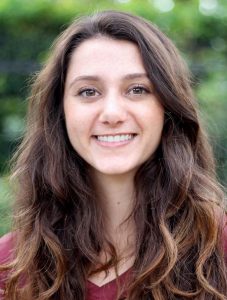
Vincent is a graduate student in the Renewable Energy Analysis Lab, overseen by Professor Daniel Kirschen, who is a UW ECE and Clean Energy Institute faculty member. Her research focuses on planning for an electrical grid capable of handling large amounts of renewable energy. She creates models that optimize expansion of power-generating capacity, transmission capability and storage in the grid.
In regard to Vincent’s work, Kirschen said, “Nina joined my lab because she is passionate about renewable energy. I look forward to working with her on developing solutions for the integration of massive amounts of wind and solar power generation in the grid.”
“I’m very honored to receive this award! It will let me focus much more heavily on my research for the rest of my studies and pursue research I’m interested in,” Vincent said. “I’ve worked with the National Renewable Energy Laboratory on projects related to my research, and I look forward to having more time to collaborate with them in the future on projects aligned with my interests.”
Daniel Tabas
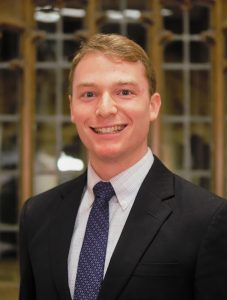
Tabas works primarily with Baosen Zhang, a UW ECE and Clean Energy Institute faculty member, and he is also a graduate student in Kirschen’s Renewable Energy Analysis Lab. The focus of Tabas’s research is control and optimization in power systems with high levels of renewable energy. He is developing mathematical techniques that help deal with temporal and geographic variability in wind and solar power production.
Zhang praised Tabas’ mathematical abilities, saying, “I find Daniel to be mathematically strong, creative and intellectually curious. He likes to go deep into a problem, which is a rare trait among young graduate students.”
“The award will help me to focus on my specific research goals and will allow me to take larger risks,” Tabas said.
Maksym Zhelyeznyakov
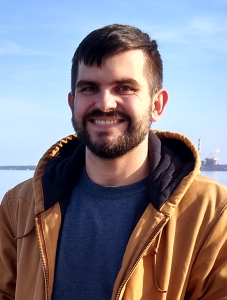
Zhelyeznyakov works in the lab of Arka Majumdar, who is a UW ECE faculty member, as well as faculty in the UW Department of Physics, the Institute for NanoEngineered Systems, and the Molecular Engineering & Sciences Institute. Zhelyeznyakov’s research supported by the award is aiming to combine the computational design of optical metamaterials and computational imaging algorithms to create compact, low-power sensors. These sensors could have applications in various types of smart, technology-empowered everyday objects, also known as the “Internet of Things.”
“Maksym has a strong background in Applied Mathematics, which helps him understand and solve complex computational problems quickly,” Majumdar said. “This resulted in several research publications in a very short period of time.”
“Receiving this award means I’ll have guaranteed funding for the next three years,” Zhelyeznyakov said. “I’ll also have a lot of freedom in how I tailor my Ph.D. thesis.”
Nicholas Yama
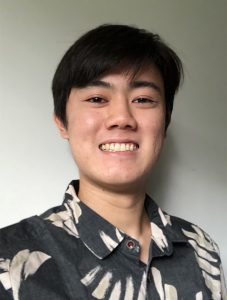 Yama is graduating this year from the University of Hawai‘i at Mānoa with a degree in electrical engineering. He will be joining UW ECE in the fall as a graduate student. Yama will be working with UW ECE faculty member Kai-Mei Fu, who is also faculty in the UW Department of Physics, director of the Optical Spintronics & Sensing Lab, and member of the Clean Energy Institute and Institute for NanoEngineered Systems. Yama’s research is geared toward studying the physics of optical defects in diamond. This work has applications in quantum information science and communications.
Yama is graduating this year from the University of Hawai‘i at Mānoa with a degree in electrical engineering. He will be joining UW ECE in the fall as a graduate student. Yama will be working with UW ECE faculty member Kai-Mei Fu, who is also faculty in the UW Department of Physics, director of the Optical Spintronics & Sensing Lab, and member of the Clean Energy Institute and Institute for NanoEngineered Systems. Yama’s research is geared toward studying the physics of optical defects in diamond. This work has applications in quantum information science and communications.
“I’m very honored to be recognized for this award, and I am glad that it will help to relieve some financial stress on myself and my adviser,” Yama said. “I hope that this will allow for some extra freedom to pursue research goals that I may not have been able to otherwise.”
NSF GRFP Honorable Mentions
UW ECE students Kyle Johnson and Lane Smith each received Honorable Mention for their applications to the NSF GRFP, which is also widely considered to be a high honor. Johnson is using principles derived from origami to construct robots capable of jumping-based locomotion, and Smith is finding ways to better integrate renewable energy sources into the electrical grid.
Kyle Johnson
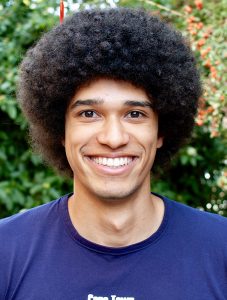
Johnson is a graduating senior who was accepted into the University of Southern California’s (USC’s) computer science masters program as well as Cornell’s, Georgia Tech’s, UCLA’s and the UW ECE’s masters programs. He has worked with UW ECE faculty member Sam Burden and took courses from UW ECE faculty member Rania Hussein.
The focus of Johnson’s research is on leveraging the unique features and properties of origami structures, specifically leaf-out origami, to build robots capable of jumping-based locomotion.
“Kyle was a student in my embedded systems and digital design courses,” Hussein said. “Besides his ability to master new skills quickly and excel in fast-paced and challenging coursework, Kyle is a role model in sharing his talent to promote a community of learners, a quality that I am a big proponent of. It was an easy decision for me to enthusiastically recommend him for this award.”
Lane Smith
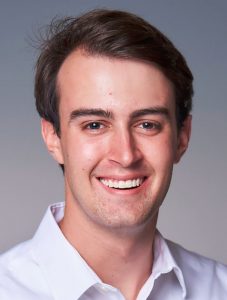
Smith is another graduate student in Kirschen’s Renewable Energy Analysis Lab, along with NSF GRFP recipients Vincent and Tabas. His research broadly focuses on distributed energy resource (DER) participation in electricity markets and utility programs. DERs are small-scale units of local power generation connected to the grid at a distribution level. Home solar panels that send power back to the main electrical grid are an example of DER participation. Through his research, Smith hopes to increase the integration of DERs, particularly renewable energy sources and energy storage, to the main electrical grid.
“Lane wrote an excellent research proposal on the integration into the grid of distributed energy resources, such as residential solar power generation,” Kirschen said. “I am very pleased that the NSF recognized his potential as a researcher by awarding Lane with an Honorable Mention.”
“The NSF GRFP Honorable Mention is a nice recognition to receive at the beginning of my research career,” Smith said. “I look forward to building on this experience for future grant-writing opportunities.”
To view all of the 2020 NSF GRFP award recipients nationwide, visit the NSF GRFP website.

